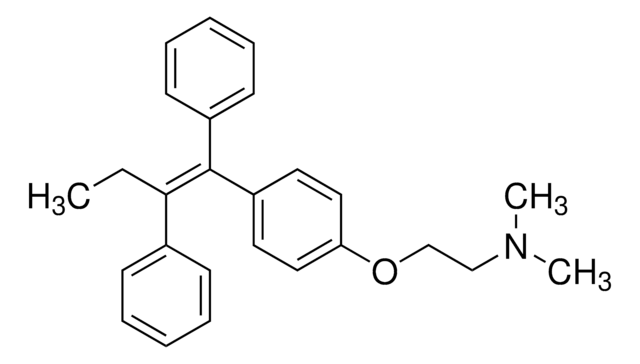T2859
Tamoxifen
powder, suitable for cell culture, BioReagent
Synonym(s):
Tamoxifen, (Z)-1-(p-Dimethylaminoethoxyphenyl)-1,2-diphenyl-1-butene, trans-2-[4-(1,2-Diphenyl-1-butenyl)phenoxy]-N,N-dimethylethylamine
About This Item
Recommended Products
product name
Tamoxifen, powder, Suitable for cell culture
Quality Level
Assay
≥99%
form
powder
storage condition
protect from light
mp
97-98 °C (lit.)
solubility
H2O: insoluble <0.1% at 20 °C
chloroform: soluble 50 mg/mL, clear, colorless to faintly yellow
2-propanol: soluble
DMSO: soluble
ethanol: soluble
methanol: soluble
propylene glycol: soluble
antibiotic activity spectrum
neoplastics
Mode of action
cell membrane | interferes
enzyme | inhibits
shipped in
ambient
storage temp.
2-8°C
SMILES string
CC\C(c1ccccc1)=C(/c2ccccc2)c3ccc(OCCN(C)C)cc3
InChI
1S/C26H29NO/c1-4-25(21-11-7-5-8-12-21)26(22-13-9-6-10-14-22)23-15-17-24(18-16-23)28-20-19-27(2)3/h5-18H,4,19-20H2,1-3H3/b26-25-
InChI key
NKANXQFJJICGDU-QPLCGJKRSA-N
Looking for similar products? Visit Product Comparison Guide
General description
Application
Biochem/physiol Actions
As an antibiotic, TAM increases membrane permeabilityand is active against Gram-positive and Gram- negative bacterial strains. It actsas both bactericidal and bacteriostatic agent.
Preparation Note
Signal Word
Danger
Hazard Statements
Precautionary Statements
Hazard Classifications
Aquatic Acute 1 - Aquatic Chronic 1 - Carc. 1A - Repr. 1B
Storage Class Code
6.1C - Combustible acute toxic Cat.3 / toxic compounds or compounds which causing chronic effects
WGK
WGK 3
Flash Point(F)
Not applicable
Flash Point(C)
Not applicable
Certificates of Analysis (COA)
Search for Certificates of Analysis (COA) by entering the products Lot/Batch Number. Lot and Batch Numbers can be found on a product’s label following the words ‘Lot’ or ‘Batch’.
Already Own This Product?
Find documentation for the products that you have recently purchased in the Document Library.
Our team of scientists has experience in all areas of research including Life Science, Material Science, Chemical Synthesis, Chromatography, Analytical and many others.
Contact Technical Service







